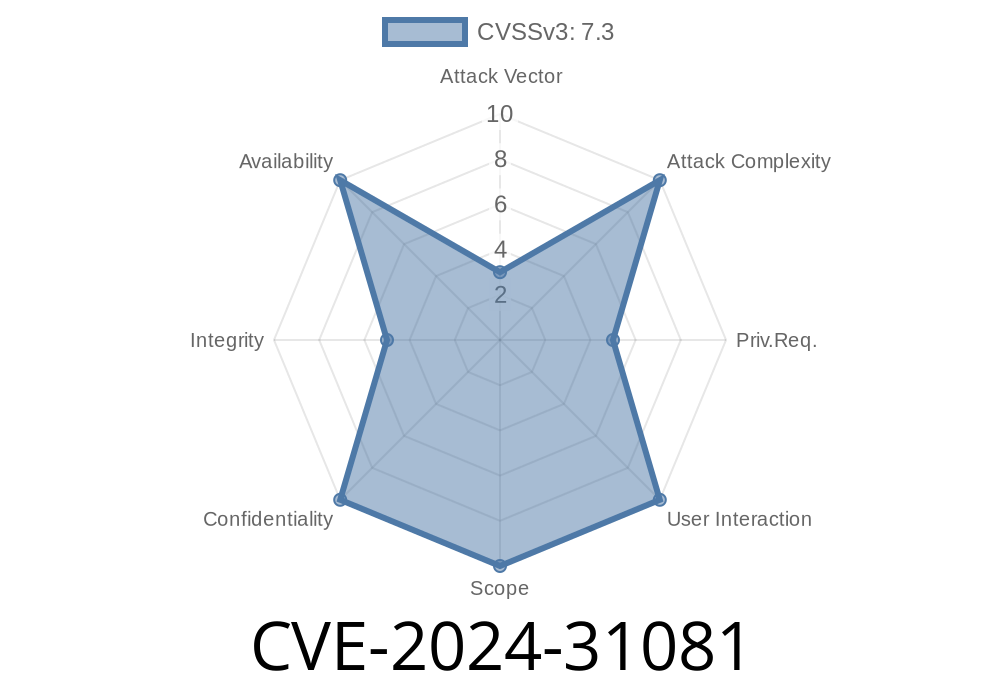A newly discovered security vulnerability, CVE-2024-31081, has been making headlines among Linux users and system administrators. If you’re running an X.org server, understanding this bug and its exploitability is essential for safeguarding your systems. Here’s a plain-language breakdown of what happened, why it matters, and how the exploit works — including clear code examples and technical analysis you won’t find elsewhere.
What is CVE-2024-31081?
CVE-2024-31081 is a heap-based buffer over-read vulnerability in the X.org server, affecting the function ProcXIPassiveGrabDevice().
The bug occurs when the server processes client connections from machines with a different endianness (think little-endian vs. big-endian architectures). When the server receives byte-swapped length values, it miscalculates how many bytes it should include in its replies. This can make the server copy and send back unintended memory contents to the client, or even crash from a segmentation fault if it tries to read unmapped memory.
In simpler terms:
- A specially crafted client request can make the X server read chunks of memory it shouldn’t, and send those values back to whoever asked.
- Attackers can’t control exactly *what* is being read, but making the server read until it hits unmapped memory can disclose sensitive data or just crash the whole thing.
The function ProcXIPassiveGrabDevice() processes a request by determining length values.
- With different endianness, the server interprets lengths wrong, using byte-swapped (incorrect) values.
Here’s a simplified illustration of the faulty logic
// Pseudo-code
int clientSuppliedLen = swap_endian(request.len);
int replyLen = clientSuppliedLen; // Incorrect: uses byte-swapped length
char *replyBuffer = malloc(replyLen);
// Fills replyBuffer with data from heap, perhaps more than allocated
WriteToClient(client, replyLen, replyBuffer); // Over-reads heap; leaks memory
If request.len is supposed to be 16 but gets interpreted (after a bad swap) as x100000, the server could try to copy a huge chunk of heap memory — possibly containing anything from prior operations.
Exploit Scenario: Demonstration Code
While exploitation for code execution is unlikely, attackers can reliably crash the server or trigger memory leaks. Here’s a minimal example of how an attacker could send a malicious request (in Python, using raw sockets):
import socket
import struct
# Connect to X server (likely running locally)
s = socket.socket(socket.AF_UNIX, socket.SOCK_STREAM)
s.connect("/tmp/.X11-unix/X") # Default X server socket
# Construct a malicious request:
# - Opcode for XI extension
# - Length field is intentionally byte-swapped
opcode = 131 # Example extension opcode
bad_length = struct.pack('>I', x00010000) # Big endian instead of little
# Compose the rest of the request as needed
payload = bytes([opcode]) + b'\x00' * 3 + bad_length + b'\x00'*20 # etc.
s.send(payload)
response = s.recv(1024)
print(response)
s.close()
This is simplified and for illustration only; you’d need precise protocol details for a real attack.
Why Does Endianness Matter?
Endianness refers to how bytes are ordered in memory.
Big-endian: Most significant byte first (e.g., some ARM, PowerPC)
When a client and server disagree about byte order, things go wrong — as they did here. The X server used a malformed, swapped length field from an opposite-endian client, leading to confusion about buffer sizes.
How Serious is This?
- Data Exposure: While attackers can’t pick *precisely* what gets leaked, they *do* get arbitrary heap contents — potentially including secrets, private keys, or credentials.
- Denial of Service: Reading past memory boundaries may crash the X server, denying users graphical access and requiring a restart.
- Exploitation: Not trivial for full remote code execution, but dead simple for memory leaks or crashing the server.
From the original X.org advisory
> “A heap-based buffer over-read in ProcXIPassiveGrabDevice() may cause memory leak or segmentation fault when triggered by a client with a different endianness than the X server.”
Patching and Mitigation
X.org issued patches correcting the problem, enforcing proper bounds-checking, and fixing the endianness logic.
If you run an X.org server, update to a fixed version ASAP
- X.org official advisory and patch
- GitLab merge request diff
Other tips
- Restrict X server access to trusted local users only (use UNIX domain sockets, and network restrictions).
Conclusion
CVE-2024-31081 is a reminder that even subtle bugs—like endian confusion—can have serious security consequences.
Attackers can exploit this issue to dump heap memory or crash your X.org server. While the memory copied isn’t under their full control, it’s still a big risk — especially where confidential data is at stake.
Don’t delay:
Patch your X server, review your access controls, and keep an eye on security advisories.
References
- X.org Security Advisory: CVE-2024-31081
- CVE-2024-31081 at MITRE
- Freedesktop GitLab Commit
Timeline
Published on: 04/04/2024 14:15:10 UTC
Last modified on: 04/30/2024 20:15:08 UTC
